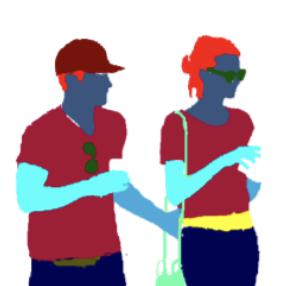Search Results for author: Yuanpeng Tu
Found 11 papers, 6 papers with code
DROP: Decouple Re-Identification and Human Parsing with Task-specific Features for Occluded Person Re-identification
1 code implementation • 31 Jan 2024 • Shuguang Dou, Xiangyang Jiang, Yuanpeng Tu, Junyao Gao, Zefan Qu, Qingsong Zhao, Cairong Zhao
Unlike mainstream approaches using global features for simultaneous multi-task learning of ReID and human parsing, or relying on semantic information for attention guidance, DROP argues that the inferior performance of the former is due to distinct granularity requirements for ReID and human parsing features.
Memory Consistency Guided Divide-and-Conquer Learning for Generalized Category Discovery
no code implementations • 24 Jan 2024 • Yuanpeng Tu, Zhun Zhong, Yuxi Li, Hengshuang Zhao
Generalized category discovery (GCD) aims at addressing a more realistic and challenging setting of semi-supervised learning, where only part of the category labels are assigned to certain training samples.
Self-supervised Feature Adaptation for 3D Industrial Anomaly Detection
no code implementations • 6 Jan 2024 • Yuanpeng Tu, Boshen Zhang, Liang Liu, Yuxi Li, Xuhai Chen, Jiangning Zhang, Yabiao Wang, Chengjie Wang, Cai Rong Zhao
Industrial anomaly detection is generally addressed as an unsupervised task that aims at locating defects with only normal training samples.
Content-Adaptive Auto-Occlusion Network for Occluded Person Re-Identification
1 code implementation • IEEE Transactions on Image Processing 2023 • Cairong Zhao, Zefan Qu, Xinyang Jiang, Yuanpeng Tu, Xiang Bai
To address these challenges, we propose a novel Content-Adaptive Auto-Occlusion Network (CAAO), that is able to dynamically select the proper occlusion region of an image based on its content and the current training status.
Self-Supervised Likelihood Estimation with Energy Guidance for Anomaly Segmentation in Urban Scenes
1 code implementation • 14 Feb 2023 • Yuanpeng Tu, Yuxi Li, Boshen Zhang, Liang Liu, Jiangning Zhang, Yabiao Wang, Cai Rong Zhao
Based on the proposed estimators, we devise an adaptive self-supervised training framework, which exploits the contextual reliance and estimated likelihood to refine mask annotations in anomaly areas.
Learning from Noisy Labels with Decoupled Meta Label Purifier
1 code implementation • CVPR 2023 • Yuanpeng Tu, Boshen Zhang, Yuxi Li, Liang Liu, Jian Li, Yabiao Wang, Chengjie Wang, Cai Rong Zhao
Training deep neural networks(DNN) with noisy labels is challenging since DNN can easily memorize inaccurate labels, leading to poor generalization ability.
Learning with Noisy labels via Self-supervised Adversarial Noisy Masking
1 code implementation • CVPR 2023 • Yuanpeng Tu, Boshen Zhang, Yuxi Li, Liang Liu, Jian Li, Jiangning Zhang, Yabiao Wang, Chengjie Wang, Cai Rong Zhao
Collecting large-scale datasets is crucial for training deep models, annotating the data, however, inevitably yields noisy labels, which poses challenges to deep learning algorithms.
 Ranked #2 on
Image Classification
on Clothing1M
(using extra training data)
Ranked #2 on
Image Classification
on Clothing1M
(using extra training data)
Learning from Noisy Labels with Coarse-to-Fine Sample Credibility Modeling
no code implementations • 23 Aug 2022 • Boshen Zhang, Yuxi Li, Yuanpeng Tu, Jinlong Peng, Yabiao Wang, Cunlin Wu, Yang Xiao, Cairong Zhao
Specifically, for the clean set, we deliberately design a memory-based modulation scheme to dynamically adjust the contribution of each sample in terms of its historical credibility sequence during training, thus alleviating the effect from noisy samples incorrectly grouped into the clean set.
Domain Camera Adaptation and Collaborative Multiple Feature Clustering for Unsupervised Person Re-ID
no code implementations • 18 Aug 2022 • Yuanpeng Tu
In this paper, we aim at finding better feature representations on the unseen target domain from two aspects, 1) performing unsupervised domain adaptation on the labeled source domain and 2) mining potential similarities on the unlabeled target domain.
Robust Learning with Adaptive Sample Credibility Modeling
no code implementations • 29 Sep 2021 • Boshen Zhang, Yuxi Li, Yuanpeng Tu, Yabiao Wang, Yang Xiao, Cai Rong Zhao, Chengjie Wang
For the clean set, we deliberately design a memory-based modulation scheme to dynamically adjust the contribution of each sample in terms of its historical credibility sequence during training, thus to alleviate the effect from potential hard noisy samples in clean set.
Salience-Guided Iterative Asymmetric Mutual Hashing for Fast Person Re-identification
2 code implementations • IEEE Transactions on Image Processing 2021 • Cairong Zhao, Yuanpeng Tu, Zhihui Lai, Fumin Shen, Heng Tao Shen, Duoqian Miao
Moreover, a novel iterative asymmetric mutual training strategy (IAMT) is proposed to alleviate drawbacks of common mutual learning, which can continuously refine the discriminative regions for SSB and extract regularized dark knowledge for two models as well.












